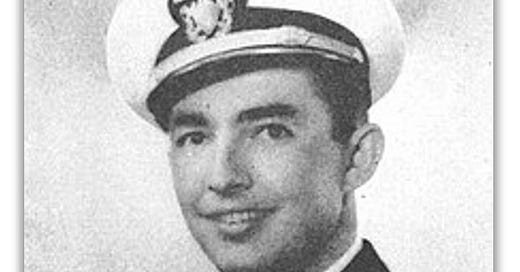Medal of Honor Monday: R. Geddie Herring
"We were all following orders . . . . I just happened to be on the firing line; that’s all,” he told a reporter.
On this day in 1945, a hero engages in an action that would earn him the Medal of Honor. Rufus “Geddie” Herring’s bravery came during World War II as he commanded a landing craft that had been converted into a gunboat.
The craft, LCI(G)-449, had already participated in several invasions of Japanese-held islands during 1944. The crew had emerged, unscathed, from those experiences, and the men were beginning to feel as if their ship was a good luck charm.
Iwo Jima would change that.
It was February 17, 1945, just two days before the planned invasion of that island. LCI(G)-449 had been tasked with assisting a pre-invasion bombardment of Iwo Jima. Along with other LCI(G)s, the vessel would also provide cover for Underwater Demolition Team (UDT) swimmers as they conducted a last-minute survey of the waters.
Those serving aboard the LCI(G)s must have been a special kind of brave, just to be there in the first place?
“The only armor on LCI(G)-449,” historian James H. Hallas explains, “was two inches of plastic splinter protection on the gun turrets, conning tower, and pilot house. That plastic would be about as much protection as a stick of butter in the event of a direct hit from a 150mm shell.”
Such a situation would prove unfortunate that day. As the LCI(G) vessels approached, the Japanese saw their formation and believed an actual invasion had begun. They unleashed a torrent of fire on the approaching American boats.
The LCI(G)s were badly outgunned, and they were about to unintentionally pay a steep price for information, as Hallas explains.
“[M]uch of the fire directed at the LCIs came from heretofore unknown and unsuspected positions,” Hallas writes. “Their premature disclosure would prove a boon to Marines who landed two days later—had they remained unidentified, these guns would have added immeasurably to the havoc wreaked on the actual landing.”
Then-Lt.(jg) Herring and his men aboard LCI(G)-449 took an especially hard hit.
In the span of about one minute, the ship was hit by three enemy shells. Two forward guns were taken out, and the bridge was hit. Dozens were injured or killed. Herring was blown out of the conning tower.
The young commanding officer had a broken arm, a broken leg, burns, and shrapnel wounds. He could see that his ship was in trouble as fires raged everywhere, but he was determined not to go down without a fight.
His Medal of Honor citation describes what happened next: “Lt. Herring resolutely climbed down to the pilothouse and, fighting against his rapidly waning strength, took over the helm, established communication with the engineroom, and carried on valiantly . . . .”
Would you believe he kept covering the UDT swimmers? He left only when every gun on his ship had been silenced, and he could help no more. By then, he was propped up against empty shell cases, and he was slipping in and out of consciousness.
An uninjured engineering officer took command, turned the ship around, and got help for the wounded and struggling crew.
Herring spent months recuperating, but he survived his action. He even fell in love with one of his nurses and married her in March 1947. By then, he’d been awarded a Medal of Honor, one of five sailors to receive the Medal for actions at Iwo Jima.
He was humble about what he’d done, as so many Medal recipients are.
“We were all in the same boat. We were all following orders . . . . I just happened to be on the firing line; that’s all,” he told a reporter. “All that any Medal of Honor man was doing was performing his particular assignment the best he knew how.”
Herring passed away in 1996, at the age of 74. Rest in peace, Sir.
Sources can always be found on my website, here.





Thank you Tara for another MOH Monday. Ltjg Rufus Herring continued command of his little LCI(G)-449 gun boat although badly injured. His mission was to provide cover for UDT swimmers. Until his boat was out of ammunition, he and his crew continued providing cover. Upon receiving the MOH Herring stated that he was among others on his boat and that they were just doing what they were assigned to do. Typical of so many American Heroes, Herring deflected his award to the action of his crew. The actual battle of Iwo Jima would begin two days after the LCI(G)-449 was nearly destroyed.
Thank you for these great MOH stories about true national heroes. Much appreciated.